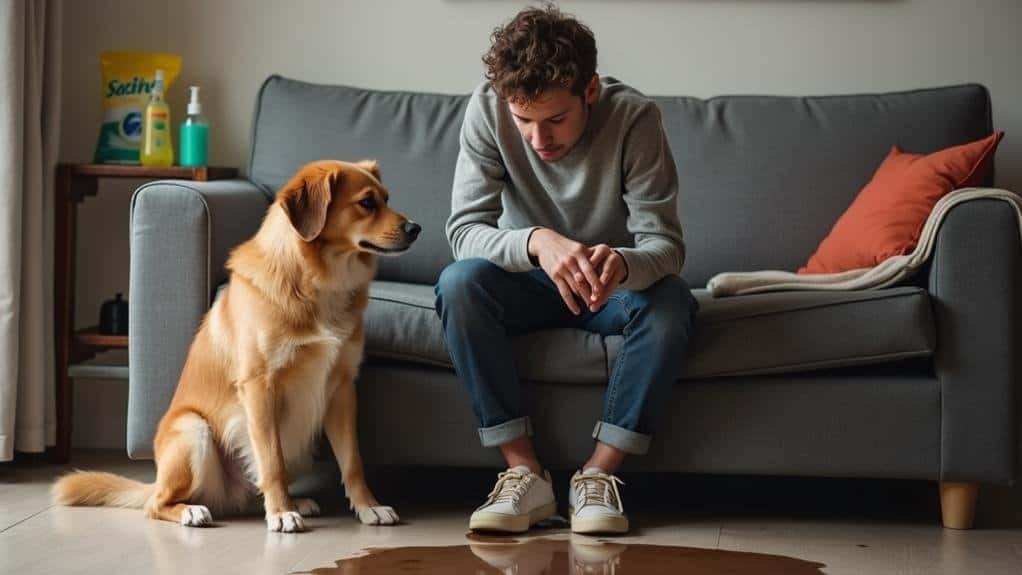Your dog peeing on you isn't about disrespect; it's often linked to behavioral or health issues. Common reasons include submissive urination, excitement, attention-seeking, or medical problems like UTIs. Young puppies and seniors are more prone to accidents. If it's submissive urination, stay calm and redirect your dog to an appropriate spot. For excitement or attention-seeking, maintain low-key greetings and use positive reinforcement. Always rule out health issues by consulting a vet. Addressing the underlying cause and implementing consistent training strategies will help prevent future incidents. Understanding your dog's behavior is key to solving this messy problem.
Understanding Canine Urination Behavior
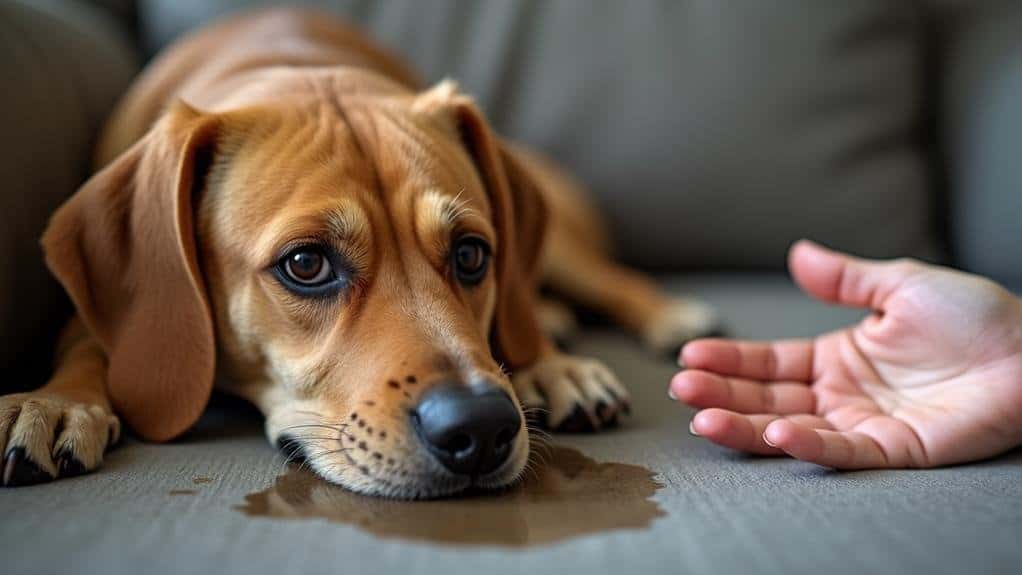
Man's best friend has a complex language, and urination is a key part of their vocabulary. When your dog pees on you, it's not necessarily a sign of disrespect or lack of affection. In fact, it can indicate trust and comfort. Dogs use urine marking as a social behavior to communicate their presence and establish territory.
Understanding your dog's urination behavior is vital. Submissive urination, often triggered by stress, fear, or anxiety, is common in young dogs or those with past negative experiences. Excitement urination can occur when your dog is overstimulated. Both behaviors may require patience and behavior modification techniques to address.
Dogs possess a vomero-nasal organ that allows them to analyze pheromones in urine, providing essential social signals for their interactions. This explains why they're so interested in sniffing where other dogs have marked.
It's important to take into account the context of urination incidents. Factors like territorial instincts or underlying medical issues can influence your dog's behavior. If you're concerned about excessive or inappropriate urination, consult your veterinarian to rule out any medical problems before addressing it as a behavioral issue.
Common Triggers for Inappropriate Peeing
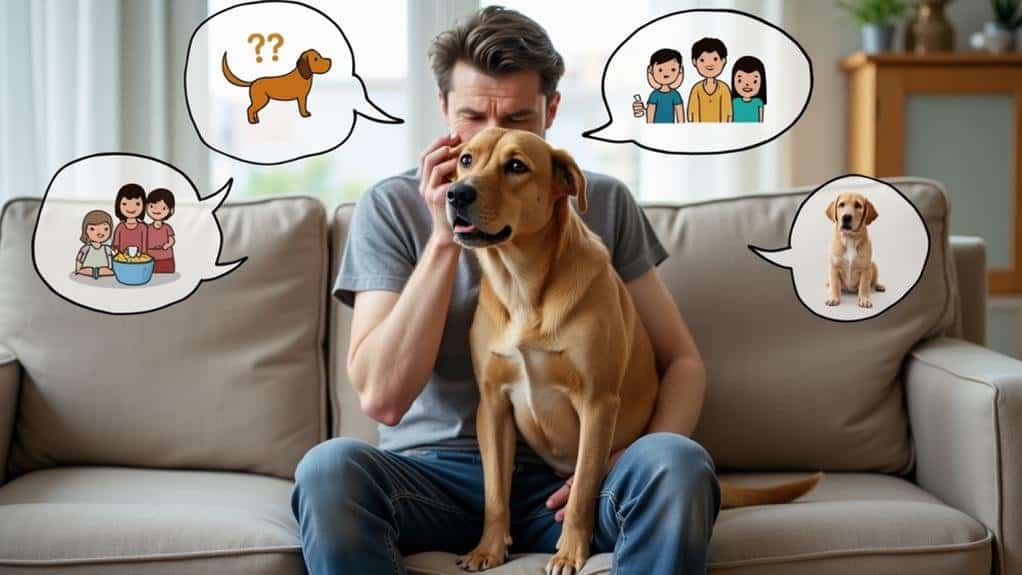
Triggers for inappropriate peeing in dogs are diverse and often misunderstood. Your dog may pee on you due to submissive urination, a behavior common in young dogs under 12 weeks old. This can be triggered by stress, fear, or excitement.
If your dog has learned that urinating gets attention, even negative, they may continue this inappropriate behavior. Loud noises, like fireworks or thunderstorms, can cause fear-induced urination, leading to loss of bladder control in stressful situations.
Changes in the household, such as moving or introducing new family members, can prompt stress marking behaviors. Dogs may also engage in urine marking as a response to strong scents, mixing their scent with others as a form of social signaling.
It's important to rule out medical reasons for inappropriate urination before addressing behavioral causes. Remember that puppies and young dogs are more prone to these behaviors as they're still developing bladder control and learning appropriate elimination habits.
Medical Causes of Urinary Issues
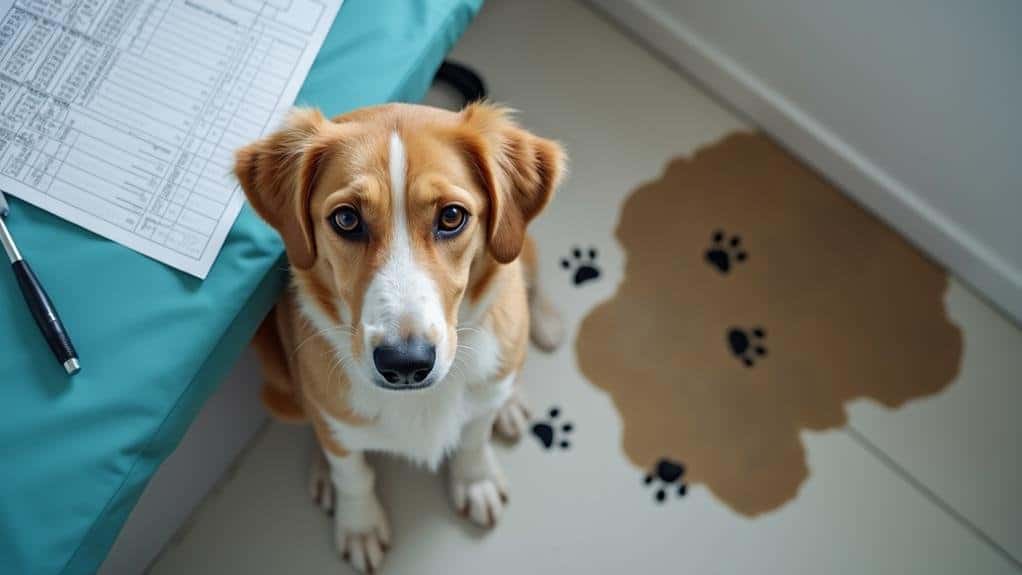
Often overlooked, medical causes can greatly contribute to urinary issues in dogs. Urinary tract infections (UTIs) are a common culprit, causing your dog discomfort and a sense of urgency that may lead to unintended urination. If you've noticed your pet peeing inappropriately, it's important to take this possibility into account.
Other medical conditions like diabetes or kidney disease can increase urine production, making it difficult for your dog to hold it in. Senior dogs are particularly susceptible to bladder control issues due to age-related factors, which can result in accidents indoors.
Don't forget about the impact of medications and dietary changes. Some treatments or alterations in your dog's diet may increase water intake, leading to more frequent urination and potential accidents. If you've recently made changes to your pet's routine, this could be a contributing factor.
To address these issues effectively, it's vital to consult a veterinarian. They can diagnose underlying health problems and provide appropriate treatment.
Addressing Submissive Urination Problems

Submissive urination can be a frustrating issue for dog owners to address. This behavior is common in puppies under 12 weeks old and often stems from fear or insecurity during interactions. If your dog exhibits this behavior, it's essential to approach the situation calmly and avoid negative reinforcement.
To address submissive urination, redirect your dog's attention by calmly taking them outside or to a designated potty area. This reinforces appropriate urination habits and helps with potty training. Use positive reinforcement techniques, such as treats and praise, to build your dog's confidence over time. Teaching commands like "sit" can also help boost their self-assurance.
Maintain a calm environment and be mindful of your body language, as aggressive postures can exacerbate the problem. Remember that scolding or punishment will likely worsen the issue.
While submissive urination is more common in puppies, older dogs may also exhibit this behavior due to past negative experiences.
Effective Training and Prevention Strategies
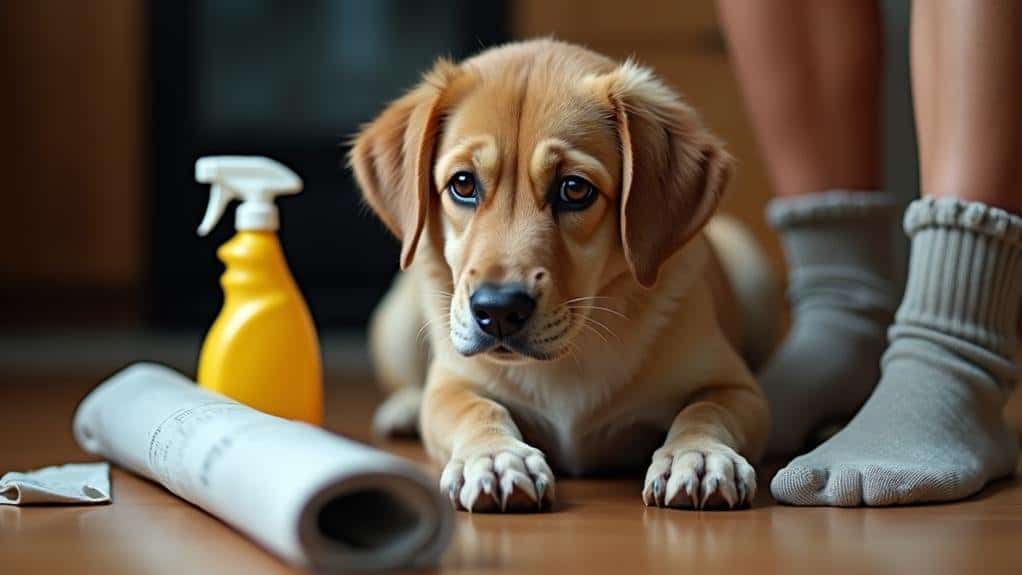
Implementing effective training and prevention strategies is essential for managing and reducing submissive urination in dogs. To address this unwanted behavior, start by maintaining calm, low-energy greetings to minimize anxiety in your dog. This approach can help your pet gain better control of their bladder during interactions.
Positive reinforcement is key to building your dog's confidence. Use treats and praise when they pee in appropriate locations, reinforcing good habits. When you notice signs that your dog needs to urinate, redirect your dog to an outdoor space. This consistent practice will help them associate elimination with the correct environment.
Keep a close eye on your dog during high-excitement situations to prevent accidents and reinforce proper behaviors. If you're struggling with persistent behavioral issues, consider consulting a professional dog trainer. They can provide tailored strategies to address anxiety and other underlying causes of submissive urination.
Remember that medical problems can sometimes contribute to urination issues, so it's important to rule out health concerns. Additionally, make certain your dog is spayed or neutered, as this can help reduce marking behaviors and other urinary problems.
Frequently Asked Questions
Should I Punish My Dog for Peeing on Me?
No, you shouldn't punish your dog for peeing on you. It's counterproductive and can worsen the behavior. Instead, focus on positive reinforcement and redirecting their actions. Understanding the underlying cause will help you address the issue more effectively.
Why Did My Dog Start Peeing in the House All of a Sudden?
Your dog's sudden indoor urination could be due to medical issues, environmental changes, stress, or inadequate housetraining. You'll need to observe their behavior, check for health problems, and consider recent changes in their routine or surroundings.
How to Correct Submissive Urination?
To correct submissive urination, keep greetings calm, use positive reinforcement, and redirect your dog's attention. Build their confidence with commands like "sit" or "shake." Be patient and consistent in your training approach, as it takes time.
Why Would a Dog Pee on Its Owners' Bed?
Your dog might pee on your bed due to territorial marking, anxiety, or submissive behavior. It could also be caused by medical issues like UTIs or incontinence. Sometimes, excitement can lead to accidental urination in this familiar space.
Conclusion
You've now got a better understanding of why your dog might have peed on you and how to address this behavior. Remember, it's rarely an act of defiance. Whether it's a medical issue, anxiety, or lack of training, you can tackle the problem. Stay patient, consult your vet if needed, and use positive reinforcement techniques. With time and consistent effort, you'll help your furry friend develop better bathroom habits and strengthen your bond.

